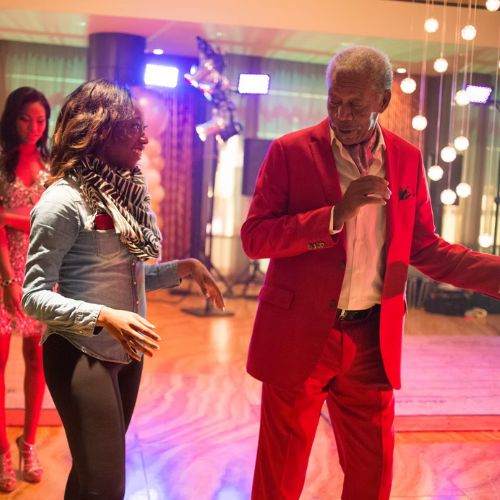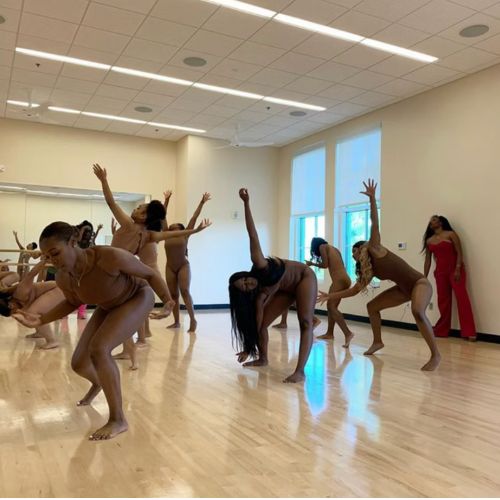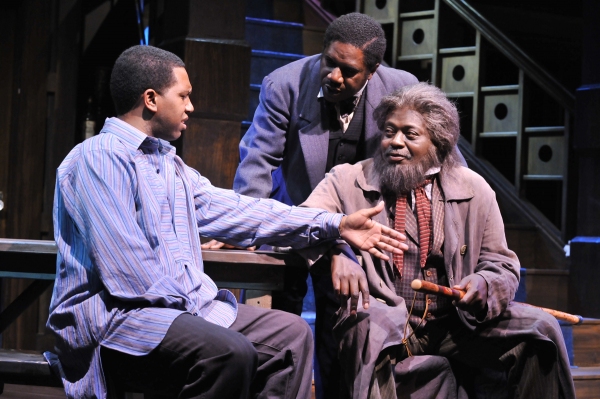Get to Know Spelman's Industry-Working Professors
Bridging Academia and Practice
At Spelman College, the classroom extends beyond campus walls, thanks to a dynamic group of industry-working professors who bridge academia and professional practice with remarkable fluency. These faculty members are not only scholars and educators but choreographers, filmmakers, actors, producers, directors, and artists actively shaping their fields in real time. Their dual roles allow them to bring industry insights directly into their teaching, equipping students with the tools, mentorship, and real-world connections needed to succeed in competitive creative landscapes. Through their lived experience and ongoing professional work, these professors transform their classrooms into launchpads for the next generation of visionary leaders.
Beyond the Dance Studio: Professor Kelley's Impact
 One such professor is Cicely A. Kelley, MFA, professionally known as CiCi Kelley, director of Spelman Dance Theater and head coach of the Spelman College Jaguarettes Dance Team. Kelley is redefining what it means to teach, lead, and create. Balancing a dynamic career in commercial dance and film/television while serving as an educator, this industry working professor exemplifies operating at the intersection of practice and teaching.
One such professor is Cicely A. Kelley, MFA, professionally known as CiCi Kelley, director of Spelman Dance Theater and head coach of the Spelman College Jaguarettes Dance Team. Kelley is redefining what it means to teach, lead, and create. Balancing a dynamic career in commercial dance and film/television while serving as an educator, this industry working professor exemplifies operating at the intersection of practice and teaching.
“I’m uniquely positioned to continuously evolve my teaching strategies, syllabi, and mentorship in response to what’s happening in the field. It's invigorating to leave my office in the CI&A building, catch a flight to join a production the next day, and return to Atlanta to engage with my students, preparing them for the realities of their emerging careers,” Kelley said. “Excellence in both environments demands exceptional time management and planning, not only to meet the expectations placed on me, but also to uphold the high standards I set for myself, my students, and the professionals I direct on set.”
Her schedule is rigorous, demanding the kind of time management and foresight that few can sustain, but this duality energizes her work in the classroom. Kelley stands at the pinnacle of achievement, boasting an impressive array of accomplishments that have captivated audiences globally, according to her biography.
Kelley's choreography and performances have graced the stage during halftime entertainment for the Atlanta Falcons Cheerleaders. Her work has also been featured in commercials for The Georgia Lottery, Apple Beats headphones, and General Car Insurance commercials featuring Shaquille O’Neal. Her creative genius also has musical credits, including choreography for Toni Braxton’s European tour, award-winning actor Morgan Freeman for the film Last Vegas, Netflix’s “The Outlaws,” featured dance performance, Beyoncé's "Get Me Bodied" music video, television appearances and many more.
Choreographing Bright Futures
 What sets Kelley apart is her industry success and how she uses it as a pipeline for student opportunity. Whether inviting students to professional sets, connecting them with her network, or nominating them for casting opportunities, her mission is clear: open doors and keep them open.
What sets Kelley apart is her industry success and how she uses it as a pipeline for student opportunity. Whether inviting students to professional sets, connecting them with her network, or nominating them for casting opportunities, her mission is clear: open doors and keep them open.
“My courses are intentionally designed to prepare students for leadership in the creative industry, empowering them to take on multifaceted roles as creative directors, choreographers, researchers, and producers," Kelley said. “I envision these dynamic, emerging women creative scholars becoming the producers of major tours, live stage productions, and award-winning films. Serving as a conduit for their growth and visibility is an extension of my passion as a working artist and educator.”
Through her work, Kelley continues to transform talent into influence, proving that mentorship and opportunity are key to shaping the future of the arts.
Lights, Camera, Lecture: The Rewarding Challenges of Balancing Teaching and Acting
Keith Arthur Bolden, MFA, actor and associate professor of theater and performance, finds that being an industry working professor requires balancing multiple roles simultaneously.
 “This season on 'Reasonable Doubt,' I conducted several of my classes virtually from the set. While this was an exciting experience for both my students and me, it can be precarious for production due to the need to maintain confidentiality about the season's secrets,” Bolden said. “Time management is also a significant factor in scheduling courses and professional work. It is extremely difficult, if not impossible, to consistently plan professional acting and directing commitments around a teaching schedule, which is unlikely to change. I might have an audition for a role on a Monday and be working on set that Wednesday. This dynamic is exciting and highly informative for the students, but it certainly impacts my sleep, as I’m committed to both jobs equally.”
“This season on 'Reasonable Doubt,' I conducted several of my classes virtually from the set. While this was an exciting experience for both my students and me, it can be precarious for production due to the need to maintain confidentiality about the season's secrets,” Bolden said. “Time management is also a significant factor in scheduling courses and professional work. It is extremely difficult, if not impossible, to consistently plan professional acting and directing commitments around a teaching schedule, which is unlikely to change. I might have an audition for a role on a Monday and be working on set that Wednesday. This dynamic is exciting and highly informative for the students, but it certainly impacts my sleep, as I’m committed to both jobs equally.”
Bolden believes his continued success, work, and influence greatly benefit students, the College, and the Atlanta University Center. He actively incorporates industry work into the classroom by inviting working professionals to discuss how projects are made, best production practices, and character development.
“I also use current audition sides for my students when we are working on audition scenes and callbacks. This approach brings best practices and current industry standards directly to the classroom. Since 2020, the industry has shifted significantly, becoming almost unrecognizable from what it was before. My continuous work within the industry keeps me familiar with all these new changes and the current landscape,” Bolden said.
 The prolific actor has experience in television, film, and theater, having appeared in programs such as "Fetch Clay, Make Man," "Two Trains Running," “A Raisin in the Sun," "Mile 22," "The Bobby Brown Story," "The Haunting of Hill House," and many more.
The prolific actor has experience in television, film, and theater, having appeared in programs such as "Fetch Clay, Make Man," "Two Trains Running," “A Raisin in the Sun," "Mile 22," "The Bobby Brown Story," "The Haunting of Hill House," and many more.
The industry-working professors help enrich the student experience, growth and their skill development. Taylor Nicole Mills, C'2026, a theatre major from Atlanta, shared how learning from industry professionals greatly enhanced her education at the College.
"Working with professionals in the industry as a theatre major has helped me tremendously. My favorite example is when my professor, Jade Lambert Smith, invited me to audition for the musical “FELA!" which she produced and directed. I was able to get in and perform professionally on multiple shows. Networking with professional actors and actresses in the industry allowed me to start making a name for myself," Mills said. "Due to performing in multiple shows outside of school, I have learned many skills that I bring back to school to share with my fellow theatre majors. These experiences help me to be a more well-rounded student, preparing me for what’s to come after graduation."
Spelman Artists in the Public Eye
While the spotlight is on Bolden and others who share their art, there is also a need to promote the unsung artists. “One challenge we face at this intersection is effectively promoting working artists within their disciplines versus merely celebrating celebrity. There is a wealth of experience, professional knowledge, and creative production within the arts division at Spelman College, yet many people are unaware of our contributions. This is partly because artists are often trained not to boast about their creative accomplishments,” Bolden said.
By creating better visibility for their contributions, Bolden believes these artists can gain the recognition they deserve and take their rightful place in the spotlight.
The Dynamic Duo of Set Design
 The identical Curley-Clay twin sisters, Moriah Curley-Clay, MFA, and Isabel A. Curley-Clay, MFA, perform double duty as scenic and costume designers and theater instructors. They are also part of the College’s industry working professors who believe there’s value in staying current and involved in the industry.
The identical Curley-Clay twin sisters, Moriah Curley-Clay, MFA, and Isabel A. Curley-Clay, MFA, perform double duty as scenic and costume designers and theater instructors. They are also part of the College’s industry working professors who believe there’s value in staying current and involved in the industry.
“We firmly believe that in the arts, especially the performing arts, it’s important to stay current and involved. We can’t be effective guides for students who are about to enter the industry if we are out of the loop,” Isabel Curley-Clay said.
Balancing professional productions with full teaching loads requires careful planning, but the Curley-Clays say it's a vital part of modeling what it means to be a working artist. “Time management is a big part of being a working artist and it’s important that students see that as well. We often bring our professional work into the classroom as examples of how theoretical works or ideas and professional practice support or oppose each other. And we can talk about unexpected challenges that come up during the design process, how they get handled and how that applies to student projects in the classroom. It’s also fun when we meet former students in our professional lives a few years after they graduate,” Isabel Curley-Clay said.
Relationships and Connections
The theater industry is built on relationships and ongoing connections. Each project introduces new collaborators, and these connections often lead to opportunities for students and graduates, such as guest speakers, internships, or jobs.
“It’s not unusual for us as a group to think about how a certain student might benefit from being introduced to a theater or position. In Atlanta, our professional connections have helped former students get internships, graduate student placements, and in a couple of cases, paid employment. I know that is true of other Spelman theater department professionals as well,” Moriah Curley-Clay said.
Maximizing Your Creativity
The Curley-Clay twins believe creativity functions like a muscle—the more you use it, the stronger and more accessible it becomes. Still, they admit that beginning a new project with a blank page can be intimidating. They emphasize the importance of developing a personal process to fuel creativity and seek inspiration. For them, the design process always begins with thorough research, both visual and academic. It involves analyzing the script, digging into the details, forming original ideas, and considering the broader context.
“We think it’s important to experience as much outside your base knowledge and lived experience as possible. In this modern tech-driven world, it’s incredibly easy to live in a space where you form ideas about yourself and others and constantly have that perspective validated through your social media feeds or other tech, but you are almost never going to be designing just that. Experiences and discomfort lead to growth, creativity, and inspiration.” Isabel Curley-Clay said.
The Curley-Clay twins prefer driving to out-of-town jobs instead of flying for three main reasons: first, experiencing new places firsthand provides richer, more valuable inspiration than photos or videos; second, they take advantage of travel time to explore unique local sites and gather visual ideas for future projects; and third, driving is a more environmentally friendly choice in their industry, which tends to generate a lot of waste.
Their attention to detail has led them to success. Both Isabel and Moriah are Suzi Bass Award winners with at least 15 wins for scenic or costume design, also a 2020 AUDELCO for scenic design, and Critics Awards in cities from Colorado to Maine, among others. The Curley-Clay twins hold a bachelor of arts from New York University and an MFA in theatrical design from Brandeis University.
Empowering Future Artists, the Legacy of Artists-Educators
By seamlessly blending their professional work with their teaching, Kelley, Bolden and the Curley-Clay twins embody the dynamic spirit of the modern artist-educator. Their commitment to staying active in the industry enriches their creativity and it equips their students with the skills, connections, and real-world insight needed to thrive in the ever-evolving artistic world.
Spelman's distinguished faculty includes numerous professionals who bridge academia and industry across disciplines. This story represents merely a sampling of our faculty's industry engagement. Visit Spelman.edu regularly to see more stories featuring our award-winning educators and researchers. Know a faculty story worth sharing? Are you a faculty member, division or department chair with a great faculty story? Email us at webteam@spelman.edu
